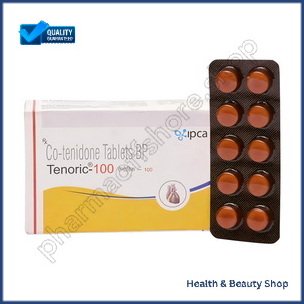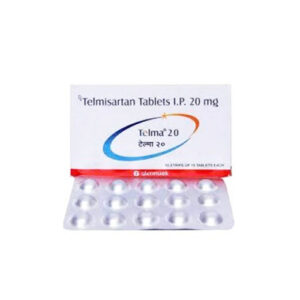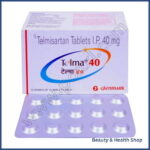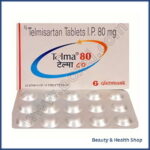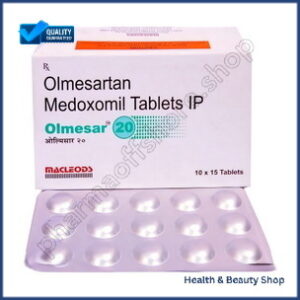ADDICTION
ALCOHOL DEPENDENCE
QUIT SMOKING
ALLERGY
ANTI FUNGAL
FUNGAL INFECTION
FUNGAL NAIL INFECTIONS
ANTI-REJECTION DRUGS
ANTI WORM
ANTIBIOTIC
BACTERIAL INFECTIONS
ARTHRITIS
GOUT
OSTEOARTHRITIS
RHEUMATOID ARTHRITIS
BLOOD
LOW PLATELET COUNT
THROMBOPHLEBITIS
VARICOSE VEINS
COLON
ANAL FISSURE
PILES
ULCERATIVE COLITIS
DIABETES CARE
DIABETES INSIPIDUS
DIABETES TYPE
DIABETIC FOOT ULCERS
GLUCOSE MONITOR
EYES/EAR CARE
DRY EYES
EYE CARE
EYE EXAMINATION
EYE INFECTION
EYE LASHES
EYE PAIN
GLAUCOMA
OCULAR HYPERTENSION
UVEITIS
FEVER CARE
MALARIA
RHEUMATIC FEVER
TYPHOID FEVER
GASTROINTESTINAL
ACIDITY
CONSTIPATION
CROHN'S DISEASE
DIARRHOEA
GALLBLADDER STONES
INTESTINAL ULCERS
IRRITABLE BOWEL SYNDROME
MOTION SICKNESS
NAUSEA
Tenoric (Atenolol/Chlorthalidone)
Tenoric 100 mg (Atenolol/Chlorthalidone)
| Active Ingredient (Generic Name): | Atenolol/Chlorthalidone |
|---|---|
| Indication: | High blood pressure |
| Manufacturer | Ipca Laboratories Ltd |
| Packaging: | 10 tablets in one strip |
From: $31.00
When it comes to Tenoric (Atenolol/Chlorthalidone), it’s a medication used for conditions like hypertension. Atenolol decreases heart rate and blood pressure, while Chlorthalidone helps reduce blood pressure by increasing urine production. Both components work together effectively. Follow your healthcare provider’s dosage instructions carefully. Take Tenoric consistently at the same time daily with a full glass of water. Don’t stop abruptly without consulting. Monitoring blood pressure regularly is important. Be cautious of symptoms like dizziness. For more details on benefits, dosage, side effects, and precautions, keep exploring the information available on Tenoric.
You may begin exploring the topic ‘start here’ by understanding its relevance in medical treatment. When it comes to medications like Tenoric (Atenolol/Chlorthalidone), it’s vital to grasp the significance of each component in treating specific conditions.
Atenolol, a beta-blocker, works by blocking the action of certain natural chemicals in your body, such as adrenaline, which can help lower blood pressure, reduce chest pain, and decrease the risk of heart attacks. Chlorthalidone, a diuretic, helps your body get rid of excess salt and water by increasing urine production, thereby lowering blood pressure and reducing swelling.
Understanding how these medications function individually and together is crucial for optimizing their effectiveness in managing conditions like hypertension and heart failure. By targeting different aspects of these conditions, Atenolol and Chlorthalidone in Tenoric complement each other to provide a more thorough approach to treatment. This synergy underscores the importance of proper medication usage and adherence to medical advice for achieving the desired therapeutic outcomes.
Why is this medication prescribed?
The prescription of Tenoric (Atenolol/Chlorthalidone) is primarily based on addressing specific cardiovascular conditions such as hypertension and heart failure. Atenolol, one of the components, belongs to a class of medications known as beta-blockers. It works by blocking the action of certain natural chemicals in the body, such as adrenaline, which can lead to increased heart rate, blood pressure, and strain on the heart. By reducing these effects, Atenolol helps in lowering blood pressure and decreasing the workload on the heart, making it beneficial for individuals with hypertension or heart failure.
Chlorthalidone, the other component of Tenoric, is a diuretic that helps the body get rid of excess salt and water by increasing urine production. This can lead to a reduction in blood volume, subsequently lowering blood pressure. When combined, Atenolol and Chlorthalidone work synergistically to effectively manage hypertension and heart failure, making Tenoric a valuable prescription for individuals with these cardiovascular conditions.
How should this medicine be used?
To properly use Tenoric (Atenolol/Chlorthalidone), follow the dosage instructions provided by your healthcare provider. This medication is usually taken by mouth once a day, with or without food. It’s important to take the medication at the same time each day to maintain a consistent level in your body. Swallow the tablets whole with a full glass of water. Don’t crush, chew, or break the tablets before swallowing.
It is essential to not suddenly stop taking Tenoric without consulting your healthcare provider, as this could lead to serious complications. If you miss a dose, take it as soon as you remember. However, if it’s almost time for your next dose, skip the missed dose and continue with your regular dosing schedule. Don’t take a double dose to make up for a missed one.
Always keep track of your medication supply and make sure to refill it in a timely manner to avoid running out of Tenoric. If you have any questions or concerns about the usage of this medication, don’t hesitate to reach out to your healthcare provider for guidance.
Other uses for this medicine
Consider discussing with your healthcare provider if Tenoric (Atenolol/Chlorthalidone) may have potential benefits for conditions other than those specified. While Tenoric is primarily used to treat high blood pressure, it may also be prescribed for other medical conditions based on your healthcare provider’s assessment. Some healthcare providers may recommend Tenoric for managing certain heart conditions like angina (chest pain) or arrhythmias (irregular heartbeats). Additionally, Tenoric can sometimes be used to help reduce the risk of heart attacks in patients with a history of cardiovascular events.
It’s essential to consult your healthcare provider before considering Tenoric for any condition other than those it’s approved for. Your healthcare provider will evaluate your specific health needs, medical history, and overall well-being to determine if Tenoric is a suitable treatment option. They’ll consider the potential benefits and risks associated with using Tenoric for off-label purposes to ensure your safety and best health outcomes.
What special precautions should I follow?
Before taking Tenoric, make sure to regularly check your blood pressure to monitor any changes.
It’s crucial to keep track of your readings and report any significant variations to your healthcare provider.
Following this precaution can help guarantee the effectiveness and safety of your treatment.
Check Your Blood Pressure
Make sure to routinely monitor your blood pressure while taking Tenoric (Atenolol/Chlorthalidone) to confirm it stays within the healthy range.
Here are some precautions you should follow:
- Check your blood pressure: Regularly measure your blood pressure at home or visit a healthcare provider.
- Stay hydrated: Drink an adequate amount of water to prevent dehydration, a potential side effect.
- Monitor for symptoms: Be aware of signs like dizziness or fainting, which may indicate low blood pressure.
- Consult your doctor: If you notice any significant changes in your blood pressure readings, inform your healthcare provider promptly.
What special dietary instructions should I follow?
To maintain the effectiveness of Tenoric (Atenolol/Chlorthalidone), it’s important to monitor your sodium intake and stay adequately hydrated. Sodium can affect blood pressure levels, so it’s advisable to moderate your salt consumption. Opt for fresh fruits and vegetables over processed foods, as they’re naturally lower in sodium.
Additionally, drinking enough water is vital when taking Tenoric, as chlorthalidone, one of its components, is a diuretic that can lead to increased urination. Aim to drink at least 8-10 glasses of water daily to prevent dehydration and maintain a healthy balance of fluids in your body.
Be mindful of alcohol consumption as well, as it can further contribute to dehydration and interfere with the medication’s efficiency. By following these dietary guidelines, you can help guarantee that Tenoric functions at its best in managing your blood pressure.
What should I do if I forget a dose?
If a dose of Tenoric (Atenolol/Chlorthalidone) is forgotten, promptly take it as soon as you remember, unless it’s close to the time for the next scheduled dose. If it’s near the next dose, then skip the missed dose and continue with your regular dosing schedule. Don’t take a double dose to make up for the one that was missed. It’s important to maintain a consistent dosing schedule to guarantee the medication’s effectiveness.
If you have trouble remembering to take your doses, consider setting an alarm or using a pill organizer to help you stay on track. If you frequently forget doses, it may be helpful to speak with your healthcare provider about potential strategies to enhance medication adherence.
Remember that consistency in taking your medication as prescribed is crucial to managing your condition effectively. If you have any concerns or questions about missed doses or your medication regimen, don’t hesitate to consult your healthcare provider for guidance.
What side effects can this medication cause?
When using Tenoric, it’s crucial to be mindful of the possible side effects it can cause. Some side effects can be significant, so it’s vital to monitor any persistent or severe symptoms closely.
If you encounter any worrisome symptoms, make sure to contact your doctor promptly for further guidance and evaluation.
Monitor Persistent or Severe Symptoms
Experiencing persistent or severe symptoms while taking Tenoric, such as dizziness or fainting, requires immediate medical attention. If you encounter any of these concerning signs, it’s essential to seek help promptly.
Here are some symptoms that may indicate a serious issue:
- Severe dizziness
- Fainting spells
- Irregular heartbeat
- Difficulty breathing
Monitoring your symptoms and recognizing when they become severe can help prevent potential complications. Don’t hesitate to contact your healthcare provider if you notice any of these warning signs while on Tenoric.
Your well-being is important, and seeking medical assistance promptly is crucial in such situations.
Some side effects can be serious. If you experience any of the following symptoms, call your doctor immediately:
Atenolol/Chlorthalidone, the combination medication known as Tenoric, can cause serious side effects that require immediate medical attention. Some side effects may indicate a severe reaction to the medication. If you experience any of the following symptoms, call your doctor immediately:
- Chest pain: This could be a sign of a heart problem or decreased blood flow.
- Difficulty breathing: It may indicate a serious allergic reaction or fluid buildup in the lungs.
- Swelling of the face, lips, throat, or tongue: This could be a sign of a severe allergic reaction.
- Irregular heartbeat or fainting: These symptoms may indicate a serious cardiac issue that needs immediate medical attention.
What should I know about the storage and disposal of this medication?
Properly store and dispose of Tenoric to guarantee its effectiveness and prevent harm to others. Keep this medication at room temperature, away from moisture and heat. Ensure it’s stored in its original container, tightly closed, and out of reach of children and pets. Avoid exposing Tenoric to extreme temperatures or direct sunlight, as this can affect its potency.
When it comes to disposal, don’t flush Tenoric down the toilet or pour it down the drain unless instructed to do so. Consult your pharmacist or local waste disposal company on how to safely dispose of unused or expired medications. It’s important to follow proper disposal guidelines to prevent accidental ingestion by children, pets, or others.
Remember to check the expiration date on your Tenoric medication and dispose of it if it has expired. By storing and disposing of Tenoric correctly, you play a significant role in ensuring the safety and effectiveness of this medication.
In case of an emergency/overdose
In case of an emergency or overdose with Tenoric, seek immediate medical attention. If you suspect that you or someone else has taken too much Tenoric, it’s vital to act promptly. Call your local emergency services or go to the nearest emergency room. Overdosing on Tenoric can lead to serious symptoms such as dangerously low blood pressure, slow heart rate, difficulty breathing, fainting, or even coma.
When seeking medical help, provide as much information as possible, including the amount of medication taken and the time it was ingested. Medical professionals will assess the situation and provide appropriate treatment. It’s important not to delay seeking help, as prompt intervention can be life-saving in cases of overdose.
Remember never to take more than the prescribed dose of Tenoric. If you accidentally take too much, don’t hesitate to seek immediate medical assistance. Your health and well-being are the utmost priority in such situations.
What other information should I know?
To enhance your understanding of Tenoric (Atenolol/Chlorthalidone), it’s vital to be aware of some additional information. It’s crucial to mention that Tenoric may interact with other medications, so inform your healthcare provider about all the drugs you’re currently taking. This includes prescription, over-the-counter, and herbal supplements, as they may impact how Tenoric works in your body.
Moreover, avoid consuming alcohol while taking Tenoric, as it can heighten the risk of side effects like dizziness and drowsiness. Make sure to rise slowly from sitting or lying down positions to prevent sudden drops in blood pressure, which can lead to fainting.
Regular monitoring of your blood pressure and electrolyte levels is essential while on Tenoric. Your doctor may also recommend periodic blood tests to check for any abnormalities. Remember to follow a healthy diet, stay hydrated, and engage in regular physical activity as part of your overall treatment plan. If you have any concerns or questions about Tenoric, don’t hesitate to consult your healthcare provider for guidance.
Brand names
Inform your healthcare provider about all the medications you are taking to guarantee safe use of Tenoric (Atenolol/Chlorthalidone) under various brand names. This medication is commonly known by different brand names depending on the manufacturer. Below is a table listing some of the brand names you may encounter for Tenoric:
| Brand Name | Manufacturer |
|---|---|
| Tenoric | IPCA Laboratories |
| Tenochlor | Ipca Laboratories |
| Aten-Chl | Sanofi-Aventis |
| Atenolol-Chlorthal | Various Manufacturers |
It is essential to recognize these brand names to ensure you are receiving the correct medication. Always check with your pharmacist or healthcare provider if there are any concerns or questions regarding the brand name of your prescription. Being informed about the different brand names can help you avoid medication errors and ensure the safe and effective use of Tenoric (Atenolol/Chlorthalidone) for your medical condition.
Purchase Locations
When looking to purchase Tenoric (Atenolol/Chlorthalidone), explore various pharmacies and online retailers for convenient purchase options. Pharmacies, both local and chain stores, are common places where you can find Tenoric. Simply visit the pharmacy counter, present your prescription, and the pharmacist will assist you in obtaining the medication.
Online retailers offer another avenue for buying Tenoric. Many reputable online pharmacies provide the option to order the medication from the comfort of your home and have it delivered to your doorstep. When buying online, make sure the pharmacy is licensed and follows proper regulations to guarantee the authenticity and quality of the medication. Some online retailers may offer discounts or convenient subscription services for regular refills.
Compare prices between different purchase locations to find the best deal. Remember to consult your healthcare provider before purchasing Tenoric to confirm it’s the right medication for your condition.
To summarise
For a concise overview, consider the following summary of key points regarding purchasing Tenoric (Atenolol/Chlorthalidone).
Tenoric, a combination medication containing Atenolol and Chlorthalidone, can be obtained through various channels. You can purchase Tenoric at local pharmacies with a valid prescription from your healthcare provider. Online pharmacies also offer Tenoric for sale, providing a convenient option for obtaining the medication.
When buying Tenoric, make sure to purchase from reputable sources to guarantee the quality and authenticity of the product. It’s essential to follow the dosage instructions provided by your doctor and adhere to the prescribed treatment plan. Additionally, compare prices from different sources to find the best deal while considering factors like shipping costs and delivery times.
Always consult your healthcare provider before starting or changing any medication regimen to ensure Tenoric is suitable for your specific medical needs. By being informed and proactive, you can effectively manage your blood pressure with Tenoric.


